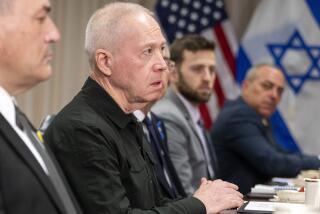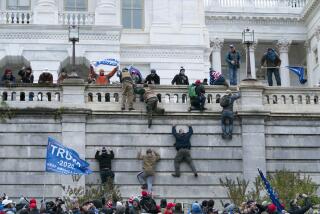Bush Strikes a Cautious Note on Iraq
- Share via
CRAWFORD, Texas — With allies uneasy about joining a U.S.-led military operation against Iraq, President Bush said Wednesday that he would consult with other nations and Congress before acting and complained about the “intense speculation” that a potential attack has provoked.
“It’s kind of a churning,” Bush said, as Defense Secretary Donald H. Rumsfeld, at his side, moved toward the microphone and interjected: “Frenzy.”
The two spoke on Bush’s ranch near here at the end of a morning-long meeting that brought most of the administration’s top national security officials, including Vice President Dick Cheney, to Central Texas to focus on long-term military issues. The president said Iraq was not discussed during the meeting.
Almost scoffing at the media attention devoted to Iraq, the president responded to a reporter’s question by calling Iraq “the particular country that you seem to be riveted on.”
In fact, the administration has kept the public eye trained on Iraq and whether it is seeking to build an arsenal of weapons of mass destruction. An Iraqi arsenal and President Saddam Hussein’s behavior are central elements as Bush seeks to gain support for whatever course he chooses--including a military invasion--to overthrow Hussein.
Top officials--beginning with the president and including Cheney, Rumsfeld and Condoleezza Rice, the president’s national security advisor--have spoken frequently about the administration’s goal of removing Hussein from power. They have made it clear that they are considering a military operation to do so, even as critics say an expanded war would threaten the anti-terrorism coalition and risk conflagration throughout the Persian Gulf and Middle East.
On Aug. 15, Brent Scowcroft, who was national security advisor during the first President Bush’s administration, wrote critically about the risks of such an operation in a Wall Street Journal column.
Bush also is facing questions about attacking Hussein from important nations in the anti-terrorism coalition his administration has assembled, including Britain, Germany, France and the Persian Gulf nation of Bahrain.
“We will continue to talk with ... the people concerned about peace, and how to secure the peace. And those are needed consultations. Not only will we consult with friends and allies, we’ll consult with members of Congress,” Bush said.
Responding to a reporter’s comment that some nations that supported the U.S. in the military action in Afghanistan were reluctant to carry the campaign into Iraq, Rumsfeld answered: “The president has ... not asked them to.”
Asked whether war planning had reached a critical point, with a decision imminent, Bush observed that Gen. Tommy Franks, whose Central Command is responsible for military operations in that part of the world, had not attended Wednesday’s meeting.
Bush, under political pressure to present a rationale for trying to unseat Hussein, said: “The American people know my position, and that is ... that regime change is in the interests of the world. How we achieve that is a matter of consultation and ... deliberation.
“I’m a deliberative person.
“We will look at all options,” Bush said, “and we will consider all technologies available to us, and diplomacy, and intelligence. But one thing is for certain: Saddam Hussein is a threat.... Nothing he has done has convinced me ... that he is the kind of fellow that is willing to forgo weapons of mass destruction, is willing to be a peaceful neighbor.”
Rumsfeld seemed to suggest that the nations that supported the campaign against terrorism might indeed be counted upon in a campaign against Iraq.
He said that “80 or 90 countries” supported the war on terrorism and “37 or 38” had representatives at U.S. Central Command’s Tampa, Fla., headquarters and that as many as “a couple of dozen countries” have troops in Afghanistan.
“The coalition that is working on the global war on terrorism ... is broad, it’s deep, it’s impressive,” he said.
Bush, Cheney, Rumsfeld and Rice were joined at the 1,600-acre ranch by White House Chief of Staff Andrew H. Card Jr., Air Force Gen. Richard B. Myers, chairman of the Joint Chiefs of Staff, and Lt. Gen. Ronald Kadish, director of the Pentagon’s Missile Defense Agency, among others, the White House said.
As Bush conferred with the national security team, his Republican allies in Congress stepped up pressure for action against Iraq. In a strongly worded speech in Houston, House Majority Whip Tom DeLay (R-Texas) declared that the Iraqi people must be liberated.
DeLay, attacking skeptics of U.S. intervention in Iraq as “apologists for idleness,” said the House would support Bush if he asks Congress to back a war resolution.
“The House will be there for the president because he’s right,” DeLay said. “America can’t wait. We can’t afford the risk. Saddam must go.”
In his news briefing, Bush said the discussion at the meeting of the military’s future was “illuminating,” and focused on “contingency plans” for future crises and how to build the military to deal with new threats.
He said the group also talked about coordinating weapon systems to allow the Army and Navy, for example, to work more closely.
“The cold, hard fact,” Rumsfeld added, “is that the United States lives in a very different security environment today in this 21st century than we did prior to Sept. 11.”
The Pentagon, he said, needs to “have the kinds of capabilities that fit the challenges and the threats that exist in the 21st century.”
Wednesday’s meeting swelled the dwindling press corps covering Bush’s nearly monthlong stay near Crawford. The grassy parking area across a lane from the former elementary school where reporters work here was filled with rental cars and trucks.
As they stood before reporters, Bush kidded Rumsfeld about his attire: The president wore cowboy boots, khakis and a long-sleeve blue sport shirt. The Defense secretary wore a gray business suit.
“Would you like to explain why you’re wearing a suit?” Bush asked the secretary.
“I don’t have any sport clothes,” Rumsfeld said.
Bush set the record straight: Rumsfeld was about to speak to troops at nearby Ft. Hood.
Rumsfeld has developed a popular following for his televised Pentagon briefings for reporters, and he spent almost as much time at the microphone as the president.
“I want to learn how you answer questions,” Bush said to the man who has served twice as secretary of Defense. “They tell me you’re quite good at it.”
Times staff writers John Hendren and Nick Anderson in Washington contributed to this report.
More to Read
Sign up for Essential California
The most important California stories and recommendations in your inbox every morning.
You may occasionally receive promotional content from the Los Angeles Times.










